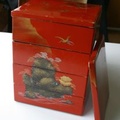From the trunk my mother packed in Los Angeles, I retrieved my metronome and my set of “The Scribner Radio Music Library,” each volume lovingly protected with Kraft paper by my mother. The set, as with my piano lessons and the piano itself, were purchased on the “payment plan,” with money that my mother put aside dollar by dollar. I asked her why she had packed them.
“So you can practice,” my mother commented.
“With no piano?” I asked, half sad and half glad at that notion.
“We'll find one.”
“We will?”
What was she thinking? I had had two years of lessons, but was no model student. I practiced halfheartedly with one eye on the clock--one half hour--and one ear on the laughter and chatter of my friends outside. I was stuck inside with scales, Hanon exercises, and the metronome.
The metronome. Click. Click. Click. Click. Mo no to nous. Tick. Tick. Tick. Tick. The metal arm tapped on ....and on. When it ran down I rewound it with the gold plated key stuck to its side. Adagio. Andante. Allegro. Funny foreign names just to say Slow, Medium, Fast. Hypnotists put their patients into a trance by swinging a pendulum back and forth, back and forth, back and forth. I could go to sleep. C major scale. Up and down. Up and down. C-D-E-F-G-A-B-C. Then C minor. C-D-E flat-F-G-A flat-B-C. C-tick. D-tick. Sleep-tick.
“Good pianists keep good time,” Miss Wilker had instructed. “Evenly. One, two, three, four. Listen to the beat. Oh, no, Yuriko, Beethoven wouldn't want the 'Fur Elise' to sound like a march, would he? Now, softly and le—ga--to---draw it o—u—t---softly---sweetly---si--ng. Yes, sing with it and you will hear the beauty of the line.”
My croaking didn't add any beauty, but when Miss Wilker played the piece, yes, I heard the beauty. Yes, it was beautiful. But for a nine year old hand to express that kind of transcendence? I asked her to repeat the piece---I wanted to hear the beautifulness again but Miss Wilker thought I was dragging my feet. It was my turn. I played pretending I was Beethoven dedicating these notes to Elise, whoever she was. Miss Wilker said I needed more practice. She always said that. That metronome restricted me. I wanted to play freely and express myself the way the advanced students played, their eyes shut, bodies swaying, wrists floating upwards. Yes, without the incessant ticking I could be expressive.
“Yuriko, please!” Miss Wilker struck her pencil on the edge of the piano. Thud, thud.
Jazz. Someone told me that when you played jazz you could make up anything, you could improvise. You could play fast and slow and nobody cared because you're baring your soul.
“Miss Wilker? Can I play jazz?”
“Of course, dear, some day, when you're better, but right now, please listen to the metronome. One, two, three, four. Make the melody sing.”
One day, as my mother predicted, two out-of-tune uprights miraculously appeared at Amache. One found a home in the auditorium of the new high school; the other, oddly, in a barrack of Block 8K, close enough so I could practice every few days. Miss Mary Watanabe, a Nisei pianist, offered lessons.
One day I showed a Scribner volume to Miss Watanabe. She told me to put them away. “The dust will ruin them,” she said simply, probably understanding their value, both monetary and rarity in camp.
“Why doesn’t she want to use them? I brought them all the way from Los Angeles for you,” my mother asked.
“She said they were ‘too precious.’”
“Tell her I want you to use them.”
I didn’t want to mediate between them. I wrapped the books in newspaper and placed them under my bed. My mother made no further comment about them.
* * *
Author's note: This story is another chapter from '18286.' Over the years, especially during Christmas season, I've wondered whose hands wrapped those gifts distributed by our Oriental santa. They probably never knew how much it meant to me/us. The story is my 'thank you.'
© 2010 Lily Yuriko Nakai Havey





